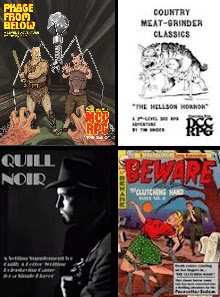 One issue that pops up in games of Mutant Future or other post-apocalyptic RPGs is the reading of Ancient signs, manuscripts, books, computer monitors, and texts. It seems like everything is marked and labeled, and whether the adventurers survive an encounter will occasionally hinge on whether they can properly translate an Ancient bit of signage or a long-forgotten map or tome. In the Mutant Future, reading is not only fundamental, it can be life-saving. But the game system for translating and understanding these Ancient bits of text is lacking. So here are some ideas on how I play those "So what's it say?" events.
One issue that pops up in games of Mutant Future or other post-apocalyptic RPGs is the reading of Ancient signs, manuscripts, books, computer monitors, and texts. It seems like everything is marked and labeled, and whether the adventurers survive an encounter will occasionally hinge on whether they can properly translate an Ancient bit of signage or a long-forgotten map or tome. In the Mutant Future, reading is not only fundamental, it can be life-saving. But the game system for translating and understanding these Ancient bits of text is lacking. So here are some ideas on how I play those "So what's it say?" events.A character can be proficient in the languages of other races and creatures per the MF rules, pg. 15, but I'd like to think that the Language of the Ancients is a bit more complicated and esoteric. Without going into overly complicated explanations and detail, I imagine that the "common tongue" of the Mutant Future is descended from the Ancient language of the region your games take place in. For instance, my Ancient language is English; yours may vary. Ergo, for roleplaying purposes, Mutant Future survivors have a basic chance of understanding any Ancient texts as their own base language is derived from it. This way, it's not required that someone choose "Ancient" as a language as everyone has the ability to fumble through a translation.
My base chance for a character to attempt an Ancient translation is a d% roll versus triple their INT. Someone with an INT of 10 has a 30% chance of correctly translating a bit of Ancient text. Someone with an INT of 15 has a 45% chance. And so on. A generous ML could also add the character's Tech Roll Modifier, to increase their likelihood of a correct reading. If a roll succeeds, the character should be able to get the general "gist" of the text as well as the major words on the sign/page. (This should only be for a sentence or two. A successful roll doesn't mean the character can suddenly read their way through The Great Gatsby.)
However, what if a character fails? Ah, this is where it gets interesting, and where I take a cue from one of my other favorite RPGs: Toon. Yes, the cartoon game. You see, in Toon, if a character fails a Read roll, they aren't told "You can't make it out." Instead, the character is given a mistranslated bit of text to deal with. "Caution: Danger Ahead!" becomes "Crazy Dances Ahead!" Whenever a PC tries to Read something, I make a secret roll instead of one out in the open. The PC doesn't know if he succeeded, nor does he know if the text I provided is correct or not. The same technique can provide a bit of tense mystery to your Mutant Future games as well.
PC1: "So what's the sign on the steel door say?"And since everyone has a chance at reading Ancient texts, it's a simple matter to have someone else double-check.
ML: (rolls behind screen) "It says, 'You should enter.'"
PC1: (to the party) "I think it says 'You should enter.' C'mon!"
The characters swing open the door with the "Do Not Enter" sign and are promptly fired upon by laser turrets in the ceiling.
PC1: "So what's the sign on the steel door say?"I've used this system for years in post-apocalyptic games where the translation of Ancient texts plays a vital role. If you have a similar system in place, I'd love to hear about it.
ML: (rolls behind screen) "It says, 'You should enter.'"
PC2: "I look at the door's sign too."
ML: (rolls) "You're pretty sure it's a warning to stay out."














































































This situation does seem to come up quite a bit, and I like your solution for it. It seems like it would be an elegant fix, without having to throw in too many other rules. Nicely done, with bonus points for appropriating an idea form Toon. ;)
ReplyDeleteI like this system a lot. It makes a certain amount of sense when one looks at modern english vs. Anglo Saxon from 1600 years ago. There are a lot of cognates, many words that are similar to German or Dutch and a lot of antinymns. Very cool.
ReplyDeleteThat's exactly it Jeffrey. When presented with an English text many hundreds or years old -- an Illuminated text or 500-year-old Bible, for example -- I can recognize several words and phrases on the page, even though the text is far removed from our own modern English and the writing is tough to decipher. But it's still English on some level. That's the philosophy driving this gameplay idea.
ReplyDelete